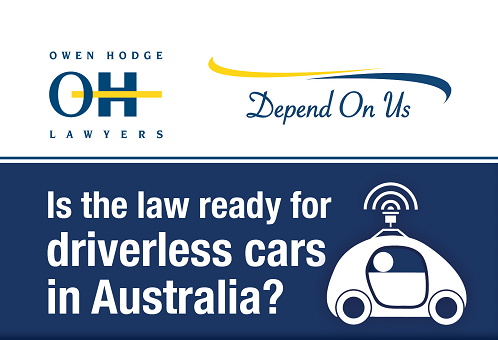
Innovation in technology has always succeeded in progressing the world forward, often leaving legal systems and ethics behind. The technology industry’s tendency to surpass the law means that lawmakers are often needing to play catch up.
With Australia expecting the first driverless car in the near future, lawmakers are continuing to grasp many of the moral and practical questions that will arise with its arrival.
The driverless car will no doubt have a large impact on Australian users, communities and road legislation, but it also raises many questions in relation to liability and safety.

Will Australian road rules change?
We are still unsure how the driverless car will adhere to various road legislation across Australia, but as it stands, for drivers there will be no changes to Australian road rules. If you own a driverless car, you will still be at fault for offenses including speeding, running a red light and not stopping at a pedestrian crossing, for example.
Tesla, the manufacturer of the driverless car have tried to relinquish responsibility for offenses relating to their cars, stating that if a system error occurs, it is the individual’s responsible to override the system.
Who’s liable in the case of an accident?

Last year, Tesla was confronted with the first fatal crash involving one of their driverless cars. A man was killed when his driverless car collided with a truck. Following the collision, the car, which was on Autopilot, continued to drive approximately 900 feet, hitting poles and trees in its path until it eventually stopped on a Floridian resident’s yard.
Tesla, who have denied responsibility for the incident, have stated that Autopilot “does not turn a Tesla into an autonomous vehicle and does not allow the driver to abdicate responsibility.”
Tesla have stressed the importance of personal responsibility for people using their product, but who would have been liable if a pedestrian was injured or killed in the car’s path of destruction? Unfortunately this is a question we cannot yet answer.
Of course as with any innovative technology, there remains ambiguity in regards to certain legal intricacies. For example the incidence of system failure and a person’s ability to interfere with the system in the case of system failure. With some road accidents unravelling in less than a second, it is questionable as to whether a person is physically and mentally nimble enough to rectify system failure while the driverless car is on the road.

Although many questions remain unanswered in relation to the legalities of the driverless car, we do know that for now there will be no changes to Australian road laws when the driverless car hits our shores. Owners will be responsible for offenses committed by their driverless car.
If you have any questions in relation to Australian road legislation, please do not hesitate to contact Owen Hodge Lawyers on 1800 770 780
